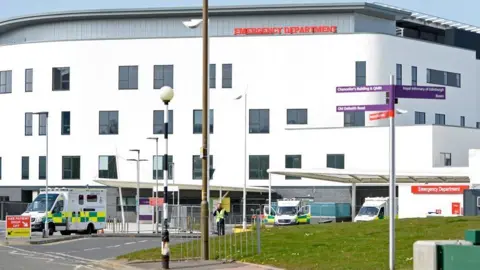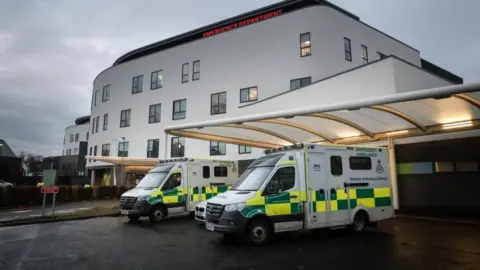A&E doctors' 'no confidence' vote in health bosses
 Getty Images
Getty ImagesDoctors in Scotland's busiest emergency department have told hospital bosses they have no confidence in them dealing with growing patient safety concerns.
A total of 27 A&E consultants at the Royal Infirmary of Edinburgh (RIE) wrote a letter of no confidence in the NHS Lothian executive board last year.
The doctors claimed they "currently cannot deliver safe, effective timely care for our patients".
NHS Lothian said it is working with them on a plan to improve the service.
News of the letter comes as A&E consultants at Glasgow's Queen Elizabeth University Hospital (QEUH) and in NHS Grampian have been raising similar concerns about patient safety.
They are calling for a Scotland-wide review of emergency treatment provision.
In May last year Healthcare Improvement Scotland (HIS) published an inspection report warning the RIE emergency department was at times operating at 300% of its capacity.
The safety watchdog found "multiple systemic failures" over two visits to the A&E.
The following month, 27 emergency department consultants signed a letter to Prof John Connaghan, NHS Lothian's chairman, to state their "loss of confidence" in the board's executives to deal with "sustained and worsening patient safety issues" raised over the three previous years.
The letter stated: "We are trained to provide emergency and urgent care in the first hours after attendance, not for protracted periods of time beyond 12 hours and into days."
The consultants pointed out there was a 80% increase in their workload during 2022 and the increased pressure on the A&E was "disproportionate" compared to other departments at the hospital.
The doctors warn that if things continue as they are then "significant patient morbidity and mortality will continue to occur".
Prof Connaghan and senior executives met with the consultants after receiving their letter and NHS Lothian said they agreed improvement actions.

The emergency department at the RIE, which opened in 2003, was built to accommodate up to 90,000 attendances per year but is now dealing with 135,000 per year.
The types of concerns raised about the RIE emergency department have been raised by doctors around Scotland in recent years.
Nearly every A&E consultant at Glasgow's QEUH wrote to Healthcare Improvement Scotland to warn patient safety was being "seriously compromised".
They offered 18 months' worth of evidence of overcrowding and staff shortages to back their claims which were not initially fully investigated by the watchdog.
Elsewhere, in August last year a group of senior doctors accused NHS Grampian of ignoring their safety concerns about emergency departments in Elgin and Aberdeen.
'Significant pressure'
Michelle Carr, chief officer of acute services at NHS Lothian, said it takes staff concerns "extremely seriously" and is working through an improvement plan for the emergency department in conjunction with the consultants.
She added: "NHS Lothian, like all other health boards in Scotland, remains under significant pressure. Our hospitals are experiencing high numbers of patients, as well as increase in trauma cases and acuity of illness.
"Overall occupancy remains high and we are working with teams throughout the hospital and in Health and Social Partnerships to ensure patients continue to receive safe, effective and timeous care, and flow back into the community as soon as they are well enough to do so.
The health executive also pointed out the "RIE is the busiest and largest hospital in NHS Lothian as well as one of the major trauma centres for some of the sickest and most seriously injured patients in south-east Scotland."
